3_talkaboutenglish_pron3
人教版初中英语talk、speak、say、tell的高频考点、句型讲练

人教版初中英语talk、speak、say、tell的高频考点、句型讲练主题句: She is talking with Lucy in English.她正和露西用英语交谈。
考点一、talk / speak / say / tell 的辨析(1) talk 名词/ 不及物动词 "谈话,交谈,演讲、报告",不涉及谈话的内容。
give a talk 作报告 have a talk 交谈talk to / with sb. 和某人交谈talk about sth. / sb. 谈论某人或某事What are they talking about? 他们在谈论什么事情?Don't make a noise. Mrs. Green is talking with Peter in the teacher's office.(2) speak 动词 "说、(在会上)发言(表达观点)",用作不及物动词,强调说话的动作或能力;用作及物动词,speak + 语言。
Can you speak English? Yes, a little. 你会说英语吗?会一点。
He is disabled. He can't speak. 他是残疾人。
他不会说话。
I want to speak at the meeting. 我想在会上发言。
(3)say 及物动词 "说"强调说话的内容,往往接名词、代词、宾语从句或直接引语,也就是说必须要有说的内容。
say to sb. 同某人说(某事)Please say it again in English. 请用英语再说一遍.He said nothing at last. 最后他什么也没说。
辨析talktotalkwithtalkabout和talkof-学易试题君之每日一题君2018学年下学期七年级英语人教(同步系列二)
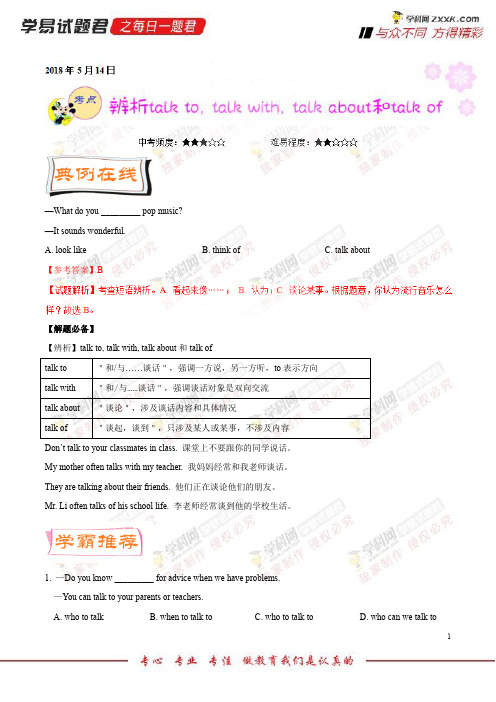
1
—What do you _________ pop music?
—It sounds wonderful.
A. look like
B. think of
C. talk about
【参考答案】
B
【解题必备】
【辨析】talk to, talk with, talk about 和talk of talk to
"和/与……谈话",强调一方说,另一方听,to 表示方向
talk with
"和/与……谈话",强调谈话对象是双向交流 talk about
"谈论",涉及谈话内容和具体情况 talk of "谈起,谈到",只涉及某人或某事,不涉及内容
Don ’t talk to your classmates in class. 课堂上不要跟你的同学说话。
My mother often talks with my teacher. 我妈妈经常和我老师谈话。
They are talking about their friends. 他们正在谈论他们的朋友。
Mr. Li often talks of his school life. 李老师经常谈到他的学校生活。
1. —Do you know _________ for advice when we have problems.
—You can talk to your parents or teachers.
A. who to talk
B. when to talk to
C. who to talk to
D. who can we talk to。
八年级英语上册第三单元知识点新版人教版

2013年八年级英语上册第三单元知识点(新版人教版)最新(2013秋)人教版八年级上册英语知识点Unit3 I’utgoing tha一、重点短语归纳1.talk about谈论2ways在某些方面an超过,多于g共同之处5.be good at sth.=do well擅长于(not) as…as…(不)如……一样……ave fun doing sth.享受做某事的乐趣ake sb. do sth.让某人做某事me 看起来一样10.talk to/with和……谈话doing sth.停止做某事 12do sth停下来接着做某事begin / start with 以……开始d with以……结束ddle of在……中间a swimming pool游泳池and另一方面(边)after that 自那以后be good with=get on well with和……相处得好20.around China=all over China全中国21.udo sth.=do sth. w用……来做……22.As you can see.正如你所见到的那样.2a不只一个姐妹24.have good grades 有好成绩2views and对立的观点和兴趣2lling jokes 喜欢讲笑话27.stay at home and read 呆在家里看书28.gb 得到这份工作29.do the same thing as sb. 跟某人做一样的事情30.ea互相lf = have great fun = have a good time 玩得高兴32.spend[in] doingd花时间做某事lan to do sth. 计划做某事a farm 在农场utgoing更外向ging唱歌比赛be similar to与……相像的/类似be the same as 和……相同;与……一致be d与……不同40. care about关心;介意be like a mirror像一面镜子42ant最重要的as long as只要;既然bring out使显现;使表现出get better grades取得更好的成绩ach for伸手取act事实上;实际上ads with sb和某人交朋友uch one’s heart感动某人50. be talented in music有音乐天赋be good at doing sth擅长做某事52. be good with善于与……相处lay the drums打鼓un fast跑得快ump high跳得高work as hard as sb.和某人一样努力工作get up early早起床g well唱得好wair头发较短的那个60.primal 小学二、重点词语用法:ugh①vi.“笑、发笑”(出声的大笑)如:We all laughed loudly wade a joke. 她说了个笑话,我们都大声笑起来。
2017年秋七年级英语上册 Module 4 Unit 7 School clubs课件 牛津深圳版

He gave his mother a big surprise. 他给了他妈妈一个大惊喜。
I was surprised at the news. 这个消息令我感到惊讶。
To my surprise, she made it at last. 使我惊讶的是,她最终成
功了。
【应用】
(1) ( C ) Mary is surprised __________ the plot(情节) of
We were amazed at the news. 我们对这个消息感到大为 惊奇。 【应用】 (1)我得到了一份令人惊奇的工作。(根据汉语意思补 全句子) I got ____a_n_____ __a_m__a_z_in_g__ job. (2)她感到如此惊奇以至于跑过去看看发生了什么事情。 (根据汉语意思补全句子) She was so __a_m__a_z_e_d__ that she ran to see what happened.
【应用】
( C ) —Shall we meet at 9 o'clock tomorrow morning?
—Sorry, let's make it ______ time.
A. other's
B. the other
C. another
【思维导图】
要点 7 amazing
【举例】Where are those amazing photos taken from? 那 些神奇的照片是在哪里拍的?
the film.
A. to
B. in
C. at
(2) To his __s_u_r_p_r_is_e__ (surprised), Tom finished it himself.
Starter Unit 3 Section B(1a-2c)七年级英语上册课件(人教版2024)
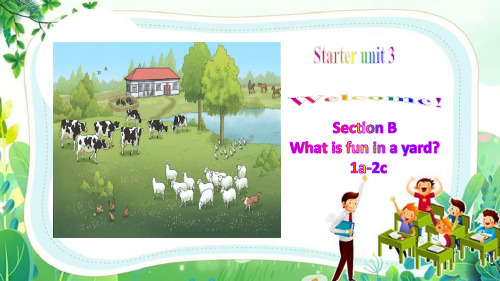
Ending the feelings like...
2b
Answer more questions about the picture in 1a.
What (有什么)
How many (有多少)
What colour(什么颜色)
Do you like it?
How many ducks
does he have? Let
me count … He has ____ (数 字) …
What else can you
see on the farm?
black and white cows a small lake black rabbits a red house brown ducks white horses white sheep big trees
Han Lin introduces his uncle's farm to Peter.
Do you see that red house? That’s my uncle’s home. It’s beautiful. Do you like myuncle's farm?
Match the main idea of each part.
Look! This is my uncle’s farm. It’s a big farm. You can see many kinds of animals. He has pigs, horses, cows, ducks, sheep and chickens. How many ducks does my uncle have? Let me count. One, two, three,four, five, ... fourteen ducks! Oh, no. Look there! Another duck is behind the big tree. Do you see that red house? That’s my uncle’s home. It’s beautiful. Do you like my uncle's farm?
人教版七年级英语上册Starter-Unit-2全单元ppt课件

5
2
7
1
4
6
3
8 8
Listen and complete the words under the pictures in 3a.
3b
a r_ul_er_ a m_a
a a_cke_t a k_ e_ y
a ui_ l_t an o_ra_n_g e_ a en
a c_u
9
3c Listen to the conversation.
…
…
… …
10
Practice the conversation with your partner.
What’s this in English?
It ’s a map.
Spell it, please.
M-A-P
11
3d Listen to the conv 3 k 1 i
•
• 6 n 8 p 10 r
5m
2j
48
2c Look and copy.
49
Write the missing big 2d letter or small letter for
each pair.
mK p R j QlO nI
50
2e Talk about what these letters mean.
3. Ask and answer.
What’s this in English?
It’s an orange.
What’s that in English?
It’s a map.
6
What’s this/that in English?
人教版中考英语一轮复习八年级上Unit3-5知识点总结+练习+练习(无答案)
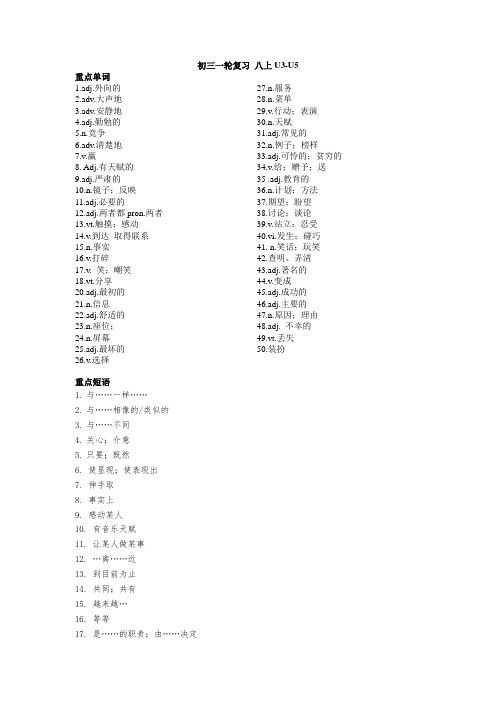
初三一轮复习八上U3-U5 重点单词1.adj.外向的2.adv.大声地3.adv.安静地4.adj.勤勉的5.n.竞争6.adv.清楚地7.v.赢8. Adj.有天赋的9.adj.严肃的10.n.镜子;反映11.adj.必要的12.adj.两者都pron.两者13.vt.触摸;感动14.v.到达取得联系15.n.事实16.v.打碎17.v. 笑;嘲笑18.vt.分享20.adj.最初的21.n.信息22.adj.舒适的23.n.座位;24.n.屏幕25.adj.最坏的26.v.选择27.n.服务28.n.菜单29.v.行动;表演30.n.天赋31.adj.常见的32.n.例子;榜样33.adj.可怜的;贫穷的34.v.给;赠予;送35 .adj.教育的36.n.计划;方法37.期望;盼望38.讨论;谈论39.v.站立;忍受40.vi.发生;碰巧41. n.笑话;玩笑42.查明、弄清43.adj.著名的44.v.变成45.adj.成功的46.adj.主要的47.n.原因;理由48.adj. 不幸的49.vt.丢失50.装扮重点短语1.与……一样……2.与……相像的/类似的3.与……不同4.关心;介意5.只要;既然6. 使显现;使表现出7. 伸手取8. 事实上9. 感动某人10. 有音乐天赋11. 让某人做某事12. …离……近13. 到目前为止14. 共同;共有15. 越来越…16. 等等17. 是……的职责;由……决定18. 编造(故事、谎言等)19. 认真对待20. (梦想、希望)实现;达到21. 认为22. 向……学习23. 弄清楚24. 发生25. 尽某人最大努力26. 就……讨论27. 有一天28. 打扮;梳理29. 代替;替换30. …的象征31. 碰巧做某事32. 乐于做某事重难点梳理1.形容词和副词的比较级1)含义2)变化规则3)用法4)比较级基本句型:主语必须与对比成分保持一致:Her hair is longer than yours.(→your hair)as+ adj./adv.(原级)+as …: “如同…一样…”否定:… not as/so+adj./adv.(原级)+as …: “不如……一样……”…… e.g. They talked more and more loudly.The比较级…,the+比较级…:越…就越… The more exercise you do, the stronger you’ll be.the+比较级+of the(two ): 两者中较…的一个Of the twins, she was the more hard-working .常用the one代单数可数名词,the ones /those 代替复数名词,that 代替不可数名词.e.g. The book here is newer than the one on the desk.The apples on the tree are fresher than those/the ones in the box.The weather in Wuhan is hotter than that in Beijing.5)修饰词1. 原级常与very, as,so, too, quite,pretty, really等连用。
导学案:Unit3 Topic3 SectionB

Unit 3 Topic 3 Section B一. Learning aims1 . 能正确使用过去进行时, was/were +doing以agree, disagree的用法。
2 . 能够用was/were 谈论过去某个时段正在发生的事情,能够用不同的方式表示同意或不同意。
3. 通过Harry Potter 的电影,学生能够养成从生活中学习英语的习惯。
Key points:1. 继续学习was/were+doing的结构。
2. 能够用I agree with you. Just so-so.等表达自己的观点。
Difficult points:1. 能够用不同的方式表达自己的观点。
2. 能够准确地使用was/were+doing。
二.重点短语、句子1.昨天晚上这个时候你在干什么?我正在看电影。
2.难道它不有趣吗?3.我不认为如此。
4.我认为它一般般。
5.同意某人的意见三、考点辨析(不)同意某人的意见______________________________________________四、练习( )1. —Look! The girl is playing with a snake. —How _______ she is!A. braveB. happyC. strongD. excited2. I was making model planes when my mother came back. (对画线部分提问)_______ _______ _______ _______ when your mother came back?3. I think classical music is boring. (改为否定句)I _______ _______ classical music is boring.4. He read a story-book last night. (改为过去进行时)He _______ _______ a story-book at eight o’clock last night.五、堂清检测Last week, I had a wonderful summer camp with my classmates. We 16 at the bus station early in the morning. After saying 17 to our parents, we got on the bus. We 18 two hours arriving at the campground. When we got there, everyone got off the bus 19 , laughing and shouting. We jumped and ran around the campground. It was the 20 time for us to be away from parents. So some of us began to feel homesick (想家的). 21 , when the night party and dances began, the homesickness disappeared. The next day, we had a 22 of climbing a mountain. At first, we climbed quickly. But on the half way, we were so 23 that we would like to give up. Our teacher 24 cheering us on. We believed that we could do better than others. Finally, we did well and my team won the match. “25 is difficult inthe world if you keep trying,”said our teacher. I also learnt a lot from the camp. ( )16. A. left B. saw C. met D. got ( )17. A. goodbye B. sorry C. yes D. hello ( )18. A. took B. spent C. paid D. cost ( )19. A. cheerfully B. bravely C. sadly D. warmly ( )20. A. one B. first C. last D. finally ( )21. A. And B. Or C. However D. So ( )22. A. interest B. idea C. chance D. match ( )23. A. tired B. excited C. happy D. active ( )24. A. stopped B. kept C. enjoyed D. preferred ( )25. A. Something B. Everything C. Nothing D. Anything。
八年级上册英语单词朗读unit3
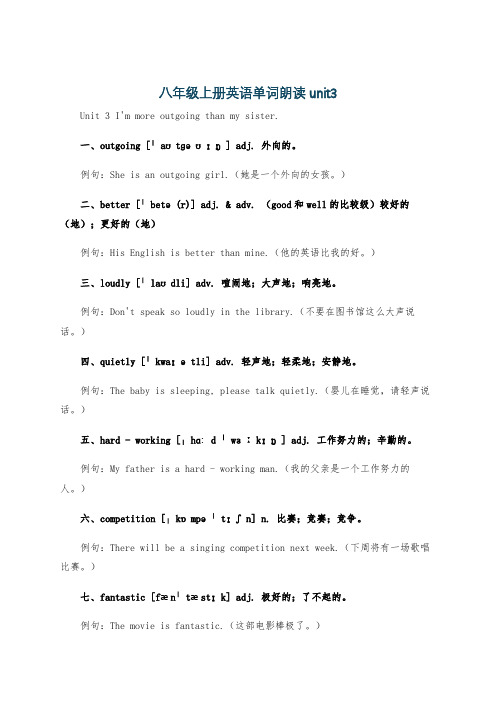
八年级上册英语单词朗读unit3Unit 3 I'm more outgoing than my sister.一、outgoing [ˈaʊtɡəʊɪŋ] adj. 外向的。
例句:She is an outgoing girl.(她是一个外向的女孩。
)二、better [ˈbetə(r)] adj. & adv. (good和well的比较级)较好的(地);更好的(地)例句:His English is better than mine.(他的英语比我的好。
)三、loudly [ˈlaʊdli] adv. 喧闹地;大声地;响亮地。
例句:Don't speak so loudly in the library.(不要在图书馆这么大声说话。
)四、quietly [ˈkwaɪətli] adv. 轻声地;轻柔地;安静地。
例句:The baby is sleeping, please talk quietly.(婴儿在睡觉,请轻声说话。
)五、hard - working [ˌhɑː d ˈwɜːkɪŋ] adj. 工作努力的;辛勤的。
例句:My father is a hard - working man.(我的父亲是一个工作努力的人。
)六、competition [ˌkɒmpəˈtɪʃn] n. 比赛;竞赛;竞争。
例句:There will be a singing competition next week.(下周将有一场歌唱比赛。
)七、fantastic [fænˈtæstɪk] adj. 极好的;了不起的。
例句:The movie is fantastic.(这部电影棒极了。
)八、which [wɪtʃ] pron. & adj. 哪一个;哪一些(用于疑问句)例句:Which book do you like?(你喜欢哪一本书?)九、clearly [ˈklɪəli] adv. 清楚地;清晰地;明白地。
人教版九年级英语Unit3知识点梳理及语法讲义(学生版)

九年级英语Unit 3知识点与语法精讲精练词汇梳理(一)完成单词梳理:名词:1. 书店 2. (美)洗手间 3. 邮票;印章4. 明信片5. 洗手间6. 浴室;洗手间7. 职工8. 葡萄9. 商场;购物中心10. 职员11. 拐角;角落12. 方向;方位13. 住址;地址14. 课程;学科15. 发言者动词:1. 建议;提议代词:1. 谁;什么人副词:1. 通常;正常情况下 2. 礼貌地;客气地介词:1. 在……旁边;在……附近形容词:1. 中心的;中央的 2. 迷人的;极有吸引力的3. 不昂贵的4. 不拥挤的;人少的5. 便利的;方便的6. 正确的;恰当的7. 有礼貌的;客气的8. 直接的;直率的9. 不礼貌的;粗鲁的兼类词:1. (v)原谅(interj)请再说一遍 2. (n/v)仓促;急促3. (adj)附近的;邻近的(adv)在附近;附近4. (v)邮寄;发电子邮件(n)邮件;信件5. (adj)东方的;东部的(adv)向东;朝东(n)东;东方6. (n/v)要求;请求7. (adj)地下的(n)地铁8. (adj)意大利(人)的(n)意大利人;意大利语(二) 词汇变形小结:1. normal (adj. 正常的) — (adv. 通常;正常情况下)2. suggest (v. 建议;提议) — (n. 建议)3. center (n. 中心) — (adj. 中心的;中央的)4. east (n. 东;东方) — (adj. 东方的)5. expensive (adj. 昂贵的) — ()6. crowd (n. 人群) — (adj. 拥挤的) — (adj. 不拥挤的)7. convenient (adj. 便利的;方便的) — (反义词:不方便的)— (n. 方便)8.polite (adj. 礼貌的) — (反义词:不礼貌的) — (adv. 礼貌地)— (反义词:不礼貌地)9. direct (adj. 直接的;直率的) — (反义词:间接的) — (adv. 直接地) direct(v. 指路;导演)— (n. 方向) — (n. 导演)10. correct(adj. 正确的) — (反义词:不正确的) — (adv. 正确地)11. speak(v. 说)— (n. 发言者)12. whom(pron. 谁,宾格)— (主格) — (pron. 谁的)13. Italy(n. 意大利) — (adj. 意大利的)【练一练】用所给词的适当形式填空1.The bus is too __________ (crowd). Let’s take the next one.2.Can you draw the ___________ (direct) from your school to your home?3.If we see someone breaking the rules, we may __________ (polite) give them some suggestions.4.It’s more __________ (convenience) to take the subway to the station than walk.5.The supermarket is in the ___________ (center) part of the city.6.It is not enough to just ask a question ____________ (correct).7.Could you please give me some___________ (suggest)about studying English?8.My cousin likes to collect ________ in his spare time. (stamp)9.There are only two ________ (postman) in the post office now.10. It’s __________ (polite) to stare at anyone or to talk loudly in public.(三) 短语攻关:抱歉;对不起;请再说一遍一双/ 路过;经过沿着……走快点儿;加油走向停车场在那时建议做某事在某人去…的路上在某人的右边彼此;相互导入;引入与……交流首次对某人说购物中心准时;按时盼望做某事做某事很兴奋知识点梳理1.Could you please tell me where the restrooms are? 请问你能告诉我洗手间在哪里吗?【用法详解】Could you please...? 该句型意为“请你……好吗?”,用于礼貌地提出请求,please后接动词原形。
人教新目标(Go for it)版知识梳理七年级下册-2 Units 1—3课件

某人(不要)做某事
词汇
含义及用法
常用搭配
说话,交谈,强调与 talk to/with sb. 与某人交谈 (to 强调主
talk 人交谈
语说,宾语听;with 强调双方交流)
talk about 谈论
说,讲,强调说话的
say 内容
say thanks/sorry to sb. 向某人道谢/歉
【语境应用】根据句意,选用talk, say, speak或tell填空。 1) Can you __sp__ea_k__ Chinese? 2) I can ___te_l_l __ you one or two things about her. 3) Please __s_a_y___ hello to your teacher. 4) They like to __ta_l_k___ about music after class.
词汇
意义
用法
through 穿过
主要表示从物体内部穿过。
prep.
over 篱笆和山脉等)的另一侧
past prep. 走过,经过 指从某特或某人旁边经过。walk/
go past (=pass)
【语境应用】请选用across, cross, through, over填空。 1) The old man often swims _a_c_r_o_s_s__ the river in winter. 2) The two friends were walking _t_h_r_o_u_g_h__ the forest. 3) Be careful when you ___c_r_o_s_s__ the street. 4) The Great Wall runs ___a_c_r_o_s_s _ the desert __o_v_e_r_ the
人教版七上英语词汇精讲--Starter Unit1-3

Starter Unit1 Good morning !1. goodadj.好的e.g. Have a good day ! 玩的开心!welladv. 好的adj. 身体状况好e.g. He plays football well. 他足球踢的好。
e.g. Tom's parents are well. 汤姆的父母身体很好。
2.morning n.早晨;上午in the morning 在早上on a cold morning 在一个寒冷的早上on Friday morning 在周五早上on the morning of May third 在五月三号早上this morning 在今天早上3.Good morning 早上好!Good afternoon 下午好!Good evening 晚上好!Good night 晚安!4.hi interj. (用于打招呼) 嗨;喂5.hello interj.你好;喂say hi/hello to sb. 和某人打招呼6.afternoon n.下午noon n.中午at noon 在正午7.evening n.晚上;傍晚night n.夜晚at night 在半夜8.how adv.怎样;如何How are you?你好吗?How old are you? 你多大了?9.are v.是(原型为be,用于第二人称单数及所有人称复数)10. you pron.你;你们e.g. You are a good boy! 你是个好孩子!11.I pron.我12.am v.是(原型为be,用于第一人称单数)I am = I'mI am not 不能缩写13.fine adj.健康的;美好的e.g. I'm fine. 我很好。
14.thanks interj.&n.感谢;谢谢=thank youe.g. Thanks a lot! / Thanks very much! 非常感谢15.OK interj.&adv.好;可以okay OK全称Starter unit 2 What's this in English1.what pron.&adj. 什么when什么时候where 哪里who 谁whose 谁的which 哪一个;哪一些how 怎么样what about doing sth.= how about doing sth. 做......怎么样so what 那又怎么样What a pity! 多么遗憾呀!2.in prep.(1) 用、以in +语言表示用…语言e.g. in English 用英语e.g. in Chinese 用汉语e.g. in Japanese 用日语(2) 在…里There are some gifts in the box.(3) in + 颜色穿着某种颜色的衣服The boy in red is my brother.3. English n. 英语adj. 英格兰的,英国人的England n. 英国Englishman n. 英国人复数:Englishmen China n. 中国Chinese n. 汉语;中国人adj. 中国的Japan n. 日本Japanese n. 日语;日本人adj. 日本的France n. 法国French n. 法语;法国人adj. 法国的Germany n. 德国German n. 德语;德国人adj. 德国的America n. 美国American n.美国人adj. 美国的4. map n. 地图a map of China 一张中国地图on the map 在地图上A of B: B的Ae.g. the door of the rooma photo of my family5. orange n. 桔子、桔汁adj. 桔色的【区别】It’s orange.It’s an orange.It’s an orange cup.6. key n.钥匙adj. 关键的a set of keys 一串钥匙(后面谓语动词用单数)the key to the door 门的钥匙key words 关键词keyboard 键盘keyword 密码the key to (doing) sth. 做......的关键key points 关键点7. this【拓展】Is this your brother? 肯定回答__________Is this boy your brother? 肯定回答__________总结:当问句的主语是this或that时,回答用it替代。
八年级下册 Units 3~4-2023中考英语四轮总复习(人教新目标版)(教师版)
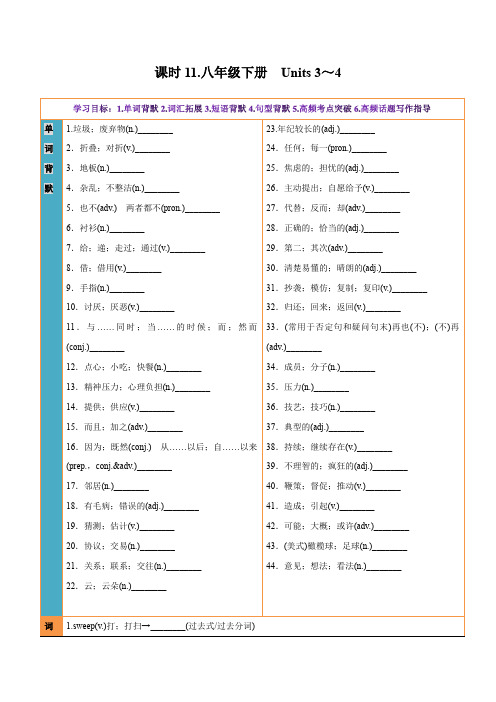
课时11.八年级下册Units 3~4【答案】一.重点单词1.rubbish 2.fold 3.floor 4.mess 5.neither6.shirt7.pass8.borrow9.finger10.hate11.while 12.snack13.stress14.provide15.anyway16.since17.neighbor18.wrong19.guess20.deal21.relation 22.cloud23.elder24.whatever25.nervous26.offer27.instead28.proper29.secondly30.clear 31.copy32.return33.anymore34.member35.pressure36.skill37.typical38.continue39.crazy 40.push41.cause42.perhaps43.football44.opinion二.词形百变1.swept 2.threw thrown 3.lent 4.wasteful save5.dependent dependence independent6.developing development7.unfair fairness8.illness9.dropped dropping10.right11.communication12.explanation petition14.ually unusual17.argument三.核心短语1.take out the rubbish 2.all the time 3.as soon as4.in order to 5.depend on 6.take care of7.look through 8.big deal9.work out10.get on with11.cut pare... with...13.in one's opinion14.give away 四.核心句型1.Could you please 2.as soon as 3.Neither do4.Why don't 5.hang out 6.Instead7.so that 高频考点突破考点1For one week, she did not do any housework and neither did I. 整整一个星期,她没做家务,我也没做。
外研社版初中英语教材单词表(全)
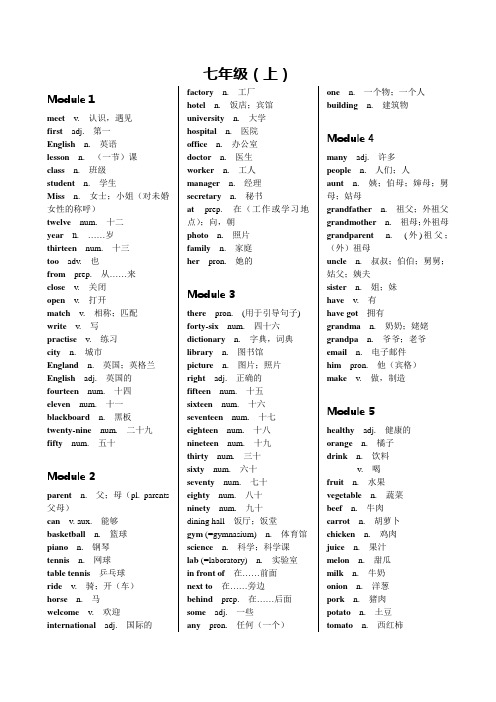
七年级(上)Module 1meet v. 认识,遇见first adj. 第一English n. 英语lesson n. (一节)课class n. 班级student n. 学生Miss n. 女士;小姐(对未婚女性的称呼)twelve num. 十二year n. ……岁thirteen num. 十三too adv. 也from prep. 从……来close v. 关闭open v. 打开match v. 相称;匹配write v. 写practise v. 练习city n. 城市England n. 英国;英格兰English adj. 英国的fourteen num. 十四eleven num. 十一blackboard n. 黑板twenty-nine num. 二十九fifty num. 五十Module 2parent n. 父;母(pl. parents 父母)can v. aux. 能够basketball n. 篮球piano n. 钢琴tennis n. 网球table tennis乒乓球ride v. 骑;开(车)horse n. 马welcome v. 欢迎international adj. 国际的factory n. 工厂hotel n. 饭店;宾馆university n. 大学hospital n. 医院office n. 办公室doctor n. 医生worker n. 工人manager n. 经理secretary n. 秘书at prep. 在(工作或学习地点);向,朝photo n. 照片family n. 家庭her pron. 她的Module 3there pron. (用于引导句子)forty-six num. 四十六dictionary n. 字典,词典library n. 图书馆picture n. 图片;照片right adj. 正确的fifteen num. 十五sixteen num. 十六seventeen num. 十七eighteen num. 十八nineteen num. 十九thirty num. 三十sixty num. 六十seventy num. 七十eighty num. 八十ninety num. 九十dining hall 饭厅;饭堂gym (=gymnasium) n. 体育馆science n. 科学;科学课lab (=laboratory) n. 实验室in front of在……前面next to在……旁边behind prep. 在……后面some adj. 一些any pron. 任何(一个)one n. 一个物;一个人building n. 建筑物Module 4many adj. 许多people n. 人们;人aunt n. 姨;伯母;婶母;舅母;姑母grandfather n. 祖父;外祖父grandmother n. 祖母;外祖母grandparent n. (外)祖父;(外)祖母uncle n. 叔叔;伯伯;舅舅;姑父;姨夫sister n. 姐;妹have v. 有have got拥有grandma n. 奶奶;姥姥grandpa n. 爷爷;老爷email n. 电子邮件him pron. 他(宾格)make v. 做,制造Module 5healthy adj. 健康的orange n. 橘子drink n. 饮料v. 喝fruit n. 水果vegetable n. 蔬菜beef n. 牛肉carrot n. 胡萝卜chicken n. 鸡肉juice n. 果汁melon n. 甜瓜milk n. 牛奶onion n. 洋葱pork n. 猪肉potato n. 土豆tomato n. 西红柿favourite adj. 最喜欢的noodle n. 面条candy n. 糖果Coke n. 可口可乐hamburger n. 汉堡包ice cream冰激凌unhealthy adj. 不健康的fridge (=refrigerator) n. 冰箱Revision module Aparty n. 晚会;聚会birthday n. 生日last adj. 刚刚过去的;最近的table n. 桌子them pron. 他/她/它们(宾格)live v. 生活;住chocolate n. 巧克力Module 6invitation n. 邀请cinema n. 电影院would v. aux. 愿意film n. 电影stadium n. 体育馆match n. 比赛star n. 明星team n. 队伍evening n. 晚上Friday n. 周五Monday n. 周一Saturda y n. 周六Sunday n. 周日Thursday n. 周四Tuesday n. 周二Wednesday n. 周三with prep. 和……一起great adj. 好极的;伟大的idea n. 想法;主意let v. 让let’s = let us让我们……when adv. 什么时候,何时invite v. 邀请on adj. & adv. 进行;上演ask v. 询问;问magic n. 魔术show n. 表演day n. 日子;白天place n. 地点price n. 价格theatre n. 剧院swimming n. 游泳come v. 来today adv. 今天plan n. 计划playground n. 操场stay v. 停留game n. 游戏Module 7talk v. 谈论about prep. 关于What about…?(询问其他人的情况)……怎么样?time n. 时间o’clock n. ……点钟half n. 一半past prep. 超过……art n. 美术;艺术chemistry n. 化学history n. 历史maths n. 数学at prep. 在(某时间或时刻)start v. 开始get up起床have v. 吃breakfast n. 早饭house n. 房子;住宅break n. (课间)休息lunch n. 午饭or conj. 或者go home回家dinner n. 晚饭;正餐finish v. 结束;完成park n. 公园housework n. 家务劳动Module 8different adj. 不同的habit n. 习惯always adv. 总是;一直card n. 卡片present n. 礼物usually adv. 通常often adv. 经常never adv. 从不get v. 得到send v. 发送OK int. 好的(表同意)ticket n. 票pair n. 双;对a pair of一双;一对trainer n. 软运动鞋jeans n. (复)牛仔裤T-shirt n. T恤concert n. 音乐会box n. 盒子silk n. 丝绸shirt n. 衬衫magazine n. 杂志novel n. 小说CD (=compact disk) n. 光盘choose v. 选择,挑选lot n. 大量;许多lots of大量;许多a lot of大量;许多clothe s n. 衣服(总称)music n. 音乐singer n. 歌手on prep. 通过,以……方式on television 通过电视;在电视上its pron. 它的think v. 想,认为think of想出Module 9trip n. 旅行zoo n. 动物园tiger n. 老虎camel n. 骆驼elephant n. 大象lion n. 狮子giraffe n. 长颈鹿kangaroo n. 袋鼠monkey n. 猴子panda n. 熊猫snake n. 蛇wolf n. 狼polar bear 北极熊guide n. 导游thousand num. 千visit v. 参观;访问n.参观;访问every adj. 每一个/只animal n. 动物zebra n. 斑马more adj. 更多Australia n. 澳大利亚Australian adj. 澳大利亚的Arctic n. 北极Europe n. 欧洲European adj. 欧洲的Asia n. 亚洲Asian adj. 亚洲的here adv. 在这里bamboo n. 竹子Africa n. 非洲African adj. 非洲的America n. 美洲;美国American adj. 美洲的;美国的;美国人的Oceania n. 大洋洲Oceanian adj. 大洋洲的desert n. 沙漠forest n. 森林jungle n. 丛林grass n. 草grassland n. 草原India n. 印度leaf n. 叶子(pl. leaves)world n. 世界Module 10keyboard n. 键盘monitor n. 显示器mouse n. 鼠标;老鼠print v. 打印printer n. 打印机connect v. 连接switch v. 用开关把……开启(或关掉)switch on接通;开(电灯、机器等)finally adv. 最后first adv. 首先document n. 文件use v. 使用click v. 点击next adv. 然后;其次save v. 保存;挽救box n. 方框then adv. 然后again adv. 再一次;又online adj. & adv. 在线travel n. 旅行download v. 下载Internet n. 网络grandchild n. (外)孙子;(外)孙女sometimes adv. 有时候;不时check v. 检查train n. 火车timetable n. 时刻表laptop n. 笔记本电脑weekend n. 周末website n. 网站London n. 伦敦information n. 信息kind n. 种类Revision module Bsubject n. 科目七年级(下)Module 1*buy v.买call v.打电话drive v.开车enjoy v.享受lie v.躺下*shop v.逛商店;购物*take v.获得;拿;抓take photos 拍照*tell v.讲;告诉*wait v.等*for prep.为;为了*wait for 等待;等候*postcard n..明信片the Great Wall长城*really adv.(表语气)真的吗a good time 美好时光a lot 非常anyway adv.(转换话题、结束谈话时说)无论如何,反正car n.小汽车put on 穿上*thing n.事情;东西leave v. 离开work n.&v.工作at home在家pub n.洒馆*restaurant n.饭馆opera n.歌剧ballet n.芭蕾舞sleep n&v.睡觉*wash v.洗;洗涤dress v.穿衣服*start n&v.开始midday n.正午*hot dog 热狗coffee n.咖啡see v.探望;看见greeting n.问候;致意at the moment 现在,此时look at 看……*soon adv.立刻;不久*love n.&v.爱;热爱See you later 再见。
Unit1知识点2021-2022学年鲁教版(五四学制)七年级上册英语

鲁教版初中英语七年级上Unit1知识点一.词汇知识1.curly adj.卷曲的--straight adj.直的eg.She has a curly hair.=Her hair is curly.2.tall adj.高的(指有生命的动物、植物、人的高)---high adj.高指建筑物山的高Eg. She is tall.=she is a tall girl. Tom is tall,and I am short.The Mount Tai is a high moutain.2.medium adj.中等的be of medium body.中等体型be of medium height.中等身高Eg. My father is medium of body and height.我爸爸中等身高,中等体型。
4.high adj.高---height n.身高高度5.thin adj.瘦的----heavy/fat adj.胖的6.heavy adj.(1)胖的(2)重的(3)雨下得大Eg. There are 26 heavy desks in our classroom. We can’t carry them.There is a heavey rain in our city.7.tonight n.夜晚今夜---today n.今天---tomorrow n.明天8.little adj.(1)少的,几乎没有(否定含义,修饰不可数名词数量)eg. There is little milk in the bottle. You can buy some tomorrow.瓶子里没有牛奶了,明天买些。
(2)a little少的,一点(肯定含义,修饰不可数名词)Eg. There is a little milk in the bottle.瓶子里还有点牛奶。
(3)小的(修饰人或动物娇小可爱)eg. I have a little cat. The little boy is Jike.9.cinema n.电影院=film=movie电影Go to the cinema=see a film=watch a movie=go to the movie10.glass n.(1)/u/玻璃eg. I can see a piece of glass on the ground.我看到地上一片玻璃。
八年级上册英语课文第三单元
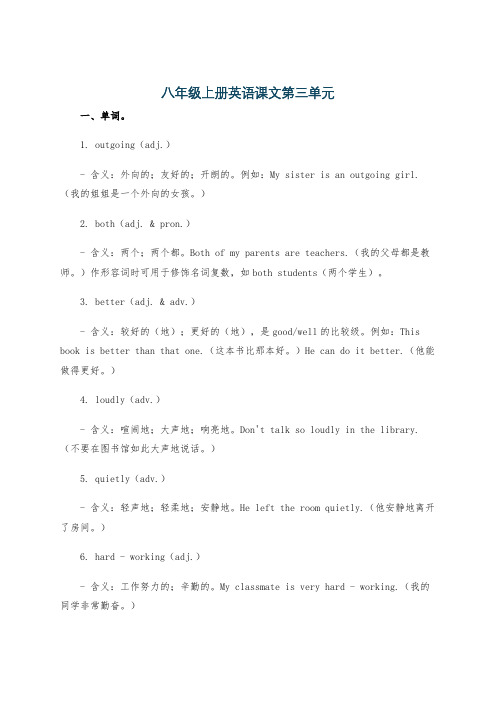
八年级上册英语课文第三单元一、单词。
1. outgoing(adj.)- 含义:外向的;友好的;开朗的。
例如:My sister is an outgoing girl.(我的姐姐是一个外向的女孩。
)2. both(adj. & pron.)- 含义:两个;两个都。
Both of my parents are teachers.(我的父母都是教师。
)作形容词时可用于修饰名词复数,如both students(两个学生)。
3. better(adj. & adv.)- 含义:较好的(地);更好的(地),是good/well的比较级。
例如:This book is better than that one.(这本书比那本好。
)He can do it better.(他能做得更好。
)4. loudly(adv.)- 含义:喧闹地;大声地;响亮地。
Don't talk so loudly in the library.(不要在图书馆如此大声地说话。
)5. quietly(adv.)- 含义:轻声地;轻柔地;安静地。
He left the room quietly.(他安静地离开了房间。
)6. hard - working(adj.)- 含义:工作努力的;辛勤的。
My classmate is very hard - working.(我的同学非常勤奋。
)7. competition(n.)- 含义:比赛;竞赛;竞争。
There will be a singing competition next week.(下周将有一场歌唱比赛。
)8. fantastic(adj.)- 含义:极好的;了不起的。
The movie is fantastic.(这部电影棒极了。
)9. clearly(adv.)- 含义:清楚地;清晰地;明白地。
Can you speak more clearly?(你能说得更清楚些吗?)10. win(v.)- 含义:获胜;赢;赢得。
杭州外国语学校初中英语七年级下册期末知识点(答案解析)
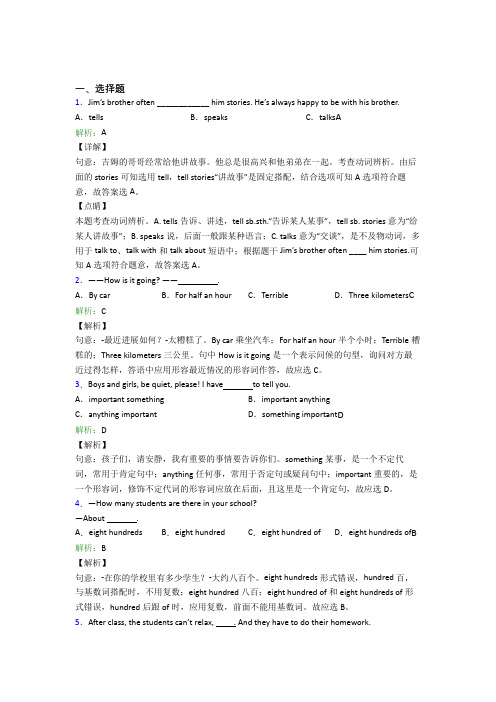
一、选择题1.Jim’s brother often ____________ him stories. He’s always happy to be with his brother. A.tells B.speaks C.talks A解析:A【详解】句意:吉姆的哥哥经常给他讲故事。
他总是很高兴和他弟弟在一起。
考查动词辨析。
由后面的stories可知选用tell,tell stories“讲故事”是固定搭配,结合选项可知A选项符合题意,故答案选A。
【点睛】本题考查动词辨析。
A. tells告诉、讲述,tell sb.sth.“告诉某人某事”,tell sb. stories意为“给某人讲故事”;B. speaks说,后面一般跟某种语言;C. talks意为“交谈”,是不及物动词,多用于talk to、talk with和talk about短语中;根据题干Jim’s brother often ____ him stories.可知A选项符合题意,故答案选A。
2.——How is it going? —— .A.By car B.For half an hour C.Terrible D.Three kilometers C 解析:C【解析】句意:-最近进展如何?-太糟糕了。
By car乘坐汽车;For half an hour半个小时;Terrible糟糕的;Three kilometers三公里。
句中How is it going是一个表示问候的句型,询问对方最近过得怎样,答语中应用形容最近情况的形容词作答,故应选C。
3.Boys and girls, be quiet, please! I have to tell you.A.important something B.important anythingC.anything important D.something important D解析:D【解析】句意:孩子们,请安静,我有重要的事情要告诉你们。
- 1、下载文档前请自行甄别文档内容的完整性,平台不提供额外的编辑、内容补充、找答案等附加服务。
- 2、"仅部分预览"的文档,不可在线预览部分如存在完整性等问题,可反馈申请退款(可完整预览的文档不适用该条件!)。
- 3、如文档侵犯您的权益,请联系客服反馈,我们会尽快为您处理(人工客服工作时间:9:00-18:30)。
BBC Learning English - Talk about EnglishJuly 18, 2005About this scriptPlease note that this is not a word for word transcript of the programme as broadcast. In the recording and editing process changes may have been made which may not be reflected here. Callum: Hello and welcome to Talk about English. I’m Callum Robertson.I n today’s programme we are looking at the topic of pronunciation and inparticular what happens to words when they are pronounced not by themselves,but when they are pronounced as part of everyday speech.To discuss these topics I’ve been joined by teacher, teacher trainer andmaterials writer, Alan Stanton. Hello AlanAlan:(brief hello)Callum: When studying vocabulary, it's important to find out how a word is pronounced, and if you know the phonemic symbols which represent the sounds of English,you can use a dictionary to find out this pronunciation. However words aren'talways pronounced the same! The pronunciation of a word can change innormal speech. Alan, can you give us some examples of this?Alan:(Recap:Linking: different kinds – there’s linking of a final consonant sound to afollowing vowel sound, for example – fried eggThere is linking of final vowel sound with initial vowel sound, either with a wsound, for example – go in. Or with a j sound, for example- say itMerging: Also when one word ends in a consonant sound and the next beginswith a consonant sound, we don’t hear both separately, we just hear one e.g.a bit tiredTalk about English © BBC Learning English July 18, 2005 Page 1 of 6Disappearing: And then there is elision where sounds that we can see in thespelling disappear in the pronunciation. This particularly affects t when it has aconsonant sound on either side e.g. just do itCallum: So we've seen that in speech, sounds link, they merge and they even disappear.Unfortunately that's not all that they do. Sounds can also change!Here are some examples. Listen to two words said individually, then listen tothem in a sentence – can you hear the difference, what is happening where thetwo words meet.INSERT EXAMPLES 1Good ….. girl. She's a good girl. Good ….. girl - Good girlAlan, what's happening hereAlan:The sound at the end of the first word is taking on the quality of the sound at the beginning of the second. So the /d/ at the end of good, becomes like the /g/at the start of good. It doesn’t disappear, it actually sounds like a /g/.Here are some more examples:INSERT EXAMPLES 2Good ….boy. He's a good boy. Good …boy. Good boyWhite …. Paper. I only use white paper. White …. Paper. White paperSpeed …. Boat. I've never been in speed boat. Speed …. Boat. Speed boatCallum:Why does this happen?Talk about English © BBC Learning EnglishAlan: The reason for this feature of connected speech – it’s called assimilation, by the way, is to do with the place in the mouth where we make sounds.For example, when you say /b/ or /p/ you can feel that both your lips arepressed together. When you say /t/ or /d/ or /n/ you can feel that your tongueis touching above your top teeth, [on a place called the alveolar ridge].When you say /k/ or /g/ or the –ng sound at the end of words like 'going', youcan feel the back of your tongue touching the roof of your mouth.What happens is that the sounds pronounced on the alveolar ridge change sothat they resemble sounds made in the other two places. For example, in thephrase ‘we can go now’ the /n/ in ‘can’ sounds like ‘ng’ because of theinfluence of the following /g/ sound. If we take the phrase ‘We can buy it’ the/n/ in ‘can’ sounds like a /m/ because of the influence of the following /b/.Callum:Let’s listen to those phrases said very slowly and then at normal speed.INSERT EXAMPLES 3We can go now. We can go now. Can go Can goWe can buy it, We can buy it. Can buy. Can buySo the same word can be pronounced in more than one way.Alan:Y es, because we could hear the strong form – can, the weak form cn, or the assimilated forms in ‘we can go now’ and ‘we can buy it’More examples: On my way here today, I walked through Green Park. If I saythis slowly it is Green Park but at normal speed it is Greem Park.Talk about English © BBC Learning EnglishINSERT EXAMPLES 4Green Park. I walked through Green Park. Green park Green parkOn Monday. He arrives on Monday. On Monday On MondayFine by. It's fine by me! Fine by fine byCallum:And sometimes sounds can disappear and cause other sounds to change. Let's hear an example of that, first within a single wordINSERT EXAMPLE 5Hand bag. I can't find my handbag. Hand bag handbagCallum: A hambag!Alan: first thing is the /d/ sound between two consonant sounds, it disappears, this now leaves the /n/ sound at the end of the first syllable, the next sound is /b/and so the lips try to say /n/ while getting into the right shape to say /b/ and thatturns it into an /m/ sound, so it sounds like ‘hambag’.Callum: That was an example from a single word. But what about in a sentence? One of the famous sites of London is an old cathedral. Listen to the words and howthey are pronounced individually then together.INSERT EXAMPLE 6Saint ….. Paul's. I'm going to visit Saint Paul's Cathedral today. Saint …. Paul's, Saint Paul'sAlan: What is happening here is that first of all we are pronouncing the word ‘saint’ in its weak form ‘st’. The /t/ sound then disappears because it has a consonantsound on either side. This puts /n/ next to /p/ so the /n/ changes to /m/ and itsound like ‘smpauls’.Talk about English © BBC Learning EnglishCallum: And isn’t there another kind of assimilation, different from what we have been discussing so far?Alan: Yes, there is a type of assimilation known as coalescent assimilation in which both sounds change to a third sound. For example when we say Could youcome tomorrow? The d at the end of could, and the j at the end of you jointogether to make a third sound, so it sound like /dz/. Other examples areINSERT EXAMPLES 7Would you. Would you like some tea? Would you – would youDid you. Did you see it?. Did you did youCallum:Today we've been looking at pronunciation and particularly at how sounds at the end of words can change when they bump into the following word, as theydo in everyday speech.Here now is another example of every day speech which doesn't exactly soundthe same as the individual words.INSERT EXAMPLES 8Do you want to get a cuppa? (like – djew wanna getta cuppa?)Alan: Quite a few things happening here! First 'Do you' - 'djew' .The /d/ and /j/ are joining to make a /dz/ soundElaborate and extend with further examples (I can get these recorded if youhave specific examples you'd like to refer toWant to – wanna – elision and weak form (though yes not a true example as arather informal(lazy?) pron.Get a – getta – linking and weak formTalk about English © BBC Learning EnglishCup of tea – cuppa – elision of /f/, weak form and linkingCallum: So when this happens and with the other features of fluent speech, like linking and joining and disappearing sounds it's not surprising that many people findlistening a difficult skill. Often what they hear doesn't seem to match what theyknow. Alan, what's your advice for students on how to deal with this.Alan: The features we have been looking at today are the inevitable result ofspeaking fast and fluently, so there is no need to deliberately practise them butknowing about them can improve your listening comprehension.One thing that learners can do is learn the phonemic symbols becaue this willenable you to find out the pronunciation of words from a dictionary. However,some of the features we have been looking at, such as sounds disappearing andchanging, are not always indicated by the phonemic symbols in dictionaries.But learners can listen carefully, especially to what happens to the sound /t/ andthe sound /m/ because these are the probably the easiest ones to spot. Somelearners might find it helpful to read aloud while listening to a cassette, if theyhave both the cassette and the tapescript.Callum: Well, I'm afraid that's all we have time for today, thank you very much Alan for being with us.Alan: G oodbyeCallum: Remember you can listen to our programmes online and do a range ofexercises including pronunciation practice on our website atHope you can join us next time for more Talk about English. GoodbyeTalk about English © BBC Learning English。
